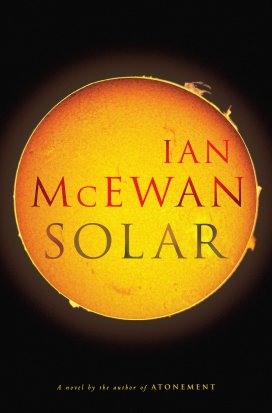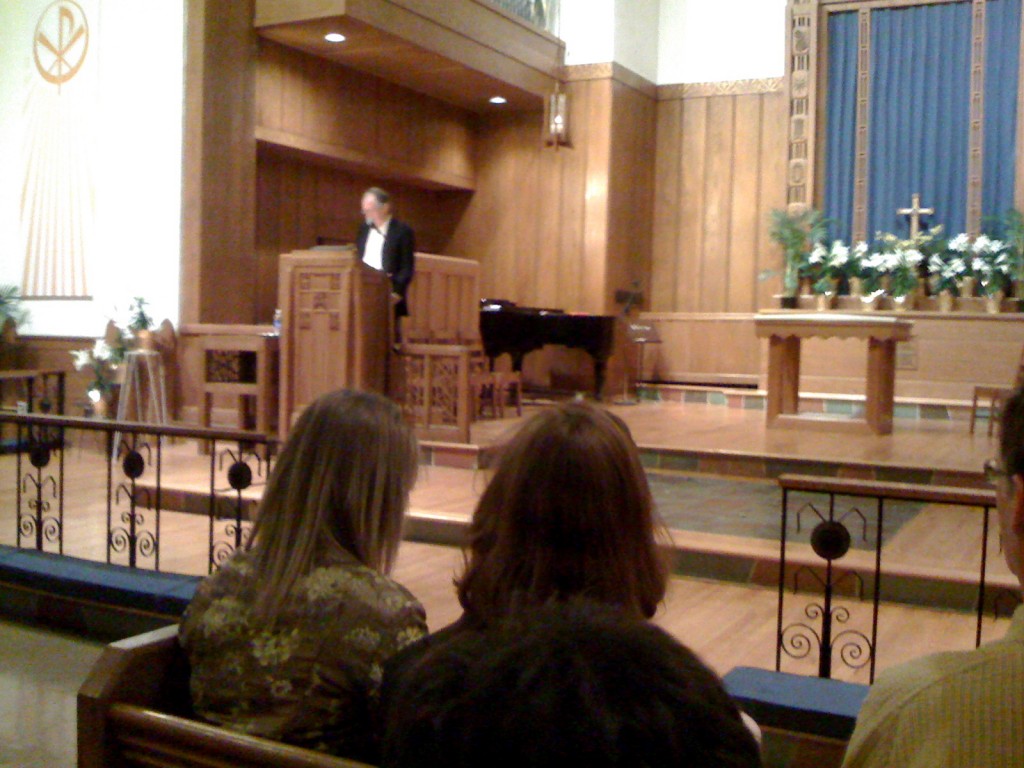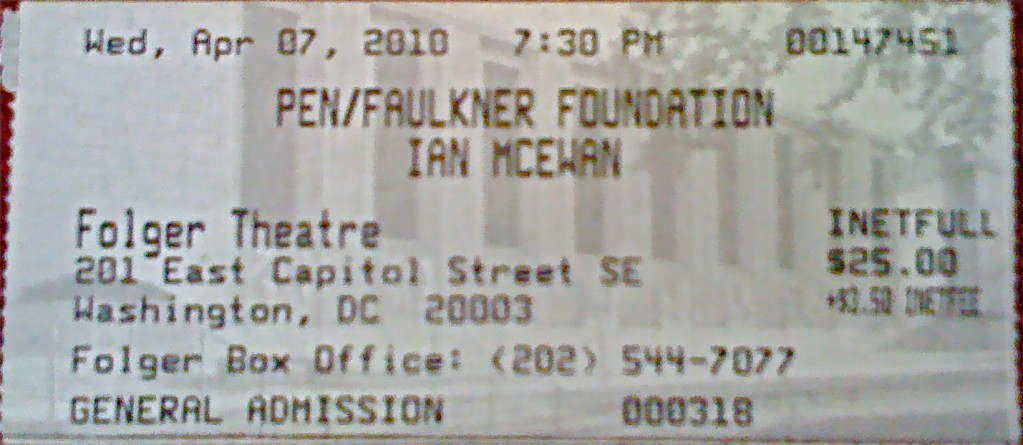.

.
“Solar” is something of a departure for McEwan. It is also something of a disappointment.
The novel traces a decade in the life of Michael Beard, a British Nobel laureate in physics. The book begins in the year 2000 as the 52-year-old scientist’s fifth marriage is dissolving (through every fault of his own), and it ends in 2009 as Beard is about to open a cutting-edge renewable energy facility in New Mexico (with personal disaster imminent).
Readers of McEwan’s earliest books (dark psychological explorations; morbid, perverse, violent) and his most recent novels (grandly serious, elegantly crafted) may be taken aback by this new work. “Solar” is being touted by its publisher and editor, Nan A. Talese, as a “comedy” — a book, she promises, you’ll find filled with “comedic antics”.
I agree with the emerging consensus among readers who’ve had access to an advance reading copy: this is not among McEwan’s best efforts.
In the best of his recent novels McEwan provides readers with the supreme pleasure of a plot and characters that fully seize your consciousness. He composes passages with such fine craft that the reader forgets the act of reading and loses awareness of the author’s hand. There are moments when you find yourself being pulled along by a frictionless, seemingly unmediated flow of story and emotion. The opening of “Enduring Love” and parts of “Saturday” achieve this magical state. Many readers, myself included, experienced this phenomenon most fully in the sweep of “Atonement”.
So a caution is in order: if you pick up “Solar”, do not expect to enjoy anything similar.
The Humor Deficiency
Why is there no magic this time? One answer is that “Solar” is, ostensibly, a “comedy”. Whether the demands of comedy are compatible with McEwan’s strengths as a writer is debatable, and there are few subjects more subjective than the question of what’s funny. Then, too, developing a sustainable comic voice is a matter of practice, of paying dues; no one should expect mastery on a first outing. I join with those who find “Solar” lacking in the art of comedy.
The first 50 pages or so are especially dispiriting: filled with lame humor, sub-Neil-Simon one-liners, and flat-footed stabs at wit. Soon thereafter comes an otherwise well-written episode set in the Arctic Circle, featuring a group of artists on an environmental tour. But when McEwan launches his jokes, there’s precious little originality. Even granting allowances for the piratical practice of comedy, you may be struck by how the best laughs are borrowed ones.
[Spoiler alert] For example, you’ve laughed many times at the dilemma of a child straight-jacketed by winter clothing (a staple of kid-centered comic strips, sitcoms, and movies), and so you’ll laugh again as McEwan spends page after page detailing the helplessness of a childish, roly-poly guy, preparing for a sub-zero trek, donning layers and layers of clothes including multiple gloves — who discovers he cannot then put on his boots, or answer a call of nature. You might squirm with delight (as you’ve done before) when the same guy is afflicted by a variation on the gag in the film, “There’s Something About Mary”, getting his genitals caught by a pants zipper. You may be familiar with the caption written by Robert Mankoff back in 1993 for his oft-reprinted cartoon in The New Yorker (the one in which an executive, trying to avoid agreeing to a meeting, rebuffs the supplicant by saying: “No, Thursday’s out. How about never — is never good for you?”). If that cartoon is part of your memory bank, you will smile when reading the flash-back scene in “Solar”, set in the 1960’s, when a coed parries young Michael Beard’s request for a date by replying: “How about never? Can you make never?” [End of Spoiler Alert]
The funny business eases off in the remainder of the book, as if McEwan grew bored with the assignment. Yes, the author can construct solid episodes of mirth, and there are bits of bright irony and satiric commentary throughout “Solar”. But McEwan falls short of nailing the tricky task of sustaining a course of original comedy for the book’s length.
The Character Deficiency
If you are a reader who prefers strong main characters and an engaging story arc, “Solar” may disappoint. It does not help matters that, for his choice of a protagonist — the figure who will be the sole thread of continuity among the vignettes that jump around in time and geography — McEwan has conjured up, in the character of Michael Beard, a thoroughly despicable man. Beard is, by his own estimation, “neither observant nor sensitive.” Worse still, he is an inveterate liar and thief, a criminal in the making, and morally bankrupt to boot (“But why should he feel guilt? Someone please tell him why.”) Being in his company is a chore — certainly so for his five discarded wives and the professional colleagues he mistreats. Perhaps for the reader too.
Do not expect any new perspective on adultery or failed relationships. At one point, when Beard is trapped by the prospect of his two current lovers bumping into each other, he sighs: “Someone, or everyone, would be disappointed. Nothing new there.” I expect at least one unhappy critic will grab onto those words for use in her or his indictment of the entire book. (Click here to read one online reviewer’s lengthy analysis, headlined with a four-word verdict: “A flabby character-portrait”). But I can’t agree with those who are totally dismissive of the work.
Extenuating Circumstances
However shaky its humor and however repulsive its protagonist’s antics, “Solar” still offers redemptive qualities and content. This is, after all, Ian McEwan, one of our best writers, and the bones of his talent cannot be disguised even in this ill-fitting raiment.
McEwan is a master analyst of decaying relationships, of psychological gamesmanship, of battles for personal supremacy. Beard’s failed marital relationships and his disputes with associates provide opportunities for the author to rehearse those tensions.
McEwan seeks to explore nested worlds: Beard’s personal circumstances; the larger sphere of the scientific community of which he is a prominent member; the enveloping social and political order (rapidly descending into disorder); and finally, the natural order of the planet (also under threat). McEwan is a terrific observer of the interrelationship of these spheres.
I was charmed by McEwan’s take on America, where he sets the final third of the book. This British author is evidently fond of our country. At one point he mentions “the plenitude and strangeness of America as represented by its television.” Beard’s American physician “could be counted on to deliver a clinical judgment with the proper neutrality, without the moral undertones, the hint of blame or poorly suppressed outrage Beard had come to expect from his [British doctors].” McEwan approvingly observes “the intimate politeness at which Americans excel.” He notices the way “Americans good-naturedly declare a class affiliation” — citing, by way of example, a woman who chews gum remorselessly. Here is how Beard’s female companion in New Mexico is described: “She was so merry, so hopelessly optimistic and well-disposed. So American.” And, of course, the weather is better here:
“Always a delicious moment to be savoured, and never to be had in the British Isles, when, showered and perfumed and wearing fresh clothes, one steps out from the air-conditioning into the smooth, invincible warmth of a southern evening.”
Among the themes McEwan briefly explores in “Solar” is the trendy academic movement that would define all areas of knowledge as “socially constructed” – even the hard sciences. The malleability of memory is a recurrent motif, as is the related phenomenon of our all too human capacity for woeful misunderstanding, leading to catastrophe. There is lively (but, again, abbreviated) attention paid to the Two Cultures debate: science versus the humanities (or, more particularly, in the case of Beard’s first marriage, physics versus poetry; Beard’s scientific way of “knowing the world” locks him out of an appreciation of “other ways” of knowing the world.).
Final Observations
In an effort to propel “Solar” forward, McEwan employs the same device used by John Irving in his most recent novel, “Last Night in Twisted River”. Each subsequent section of the book leaps ahead several years, and, after the reader is duly situated into the new period, the author uses flashbacks to fill in the gap. This technique, which might annoy some as desultory, actually does the work of keeping the reader engaged.
The book’s second most important character — a young post-doctorate member of the team of scientists at the British Centre for Renewable Energy — hides a clue to the novel. His name is Tom Aldous. That name, I believe, is a conflation of the names of two real persons, from two previous centuries. McEwen, whose 21st century novel features the dominant science story of our day (climate change) as its “background hum“, has decided to invoke Thomas Henry Huxley, the 19th century scientist who championed the world-altering scientific development of his era, Darwinism. “Tom” Huxley is linked to his grandson, Aldous Huxley, the 20th century author of the enduring utopian novel, “Brave New World”. Aldous was also a writer of satiric novels, some of which featured a topical scientific twist. There may be a humbling lesson in the fact that those satiric novels have long since been forgotten.
_____________________________________
Addendum: A Weird Coincidence (a/k/a, the Bacon Bookmark)
On page 167 of “Solar”, McEwan illustrates Michael Beard’s disorderly habits with the story of the time his third wife, while cleaning their home, “discovered in the pages of a valuable first edition an ancient rasher of his breakfast bacon doubling as a bookmark.” A day after I read that passage — cringe-inducing if you’re a book lover — I happened to be watching Stephen Colbert’s interview with Jonathan Safran Foer, author of “Eating Animals”. At the end of the segment, Colbert uses a strip of bacon to mark his place in his copy of Foer’s book. Check out the video, here; Colbert brings out the bacon at 4:45.


